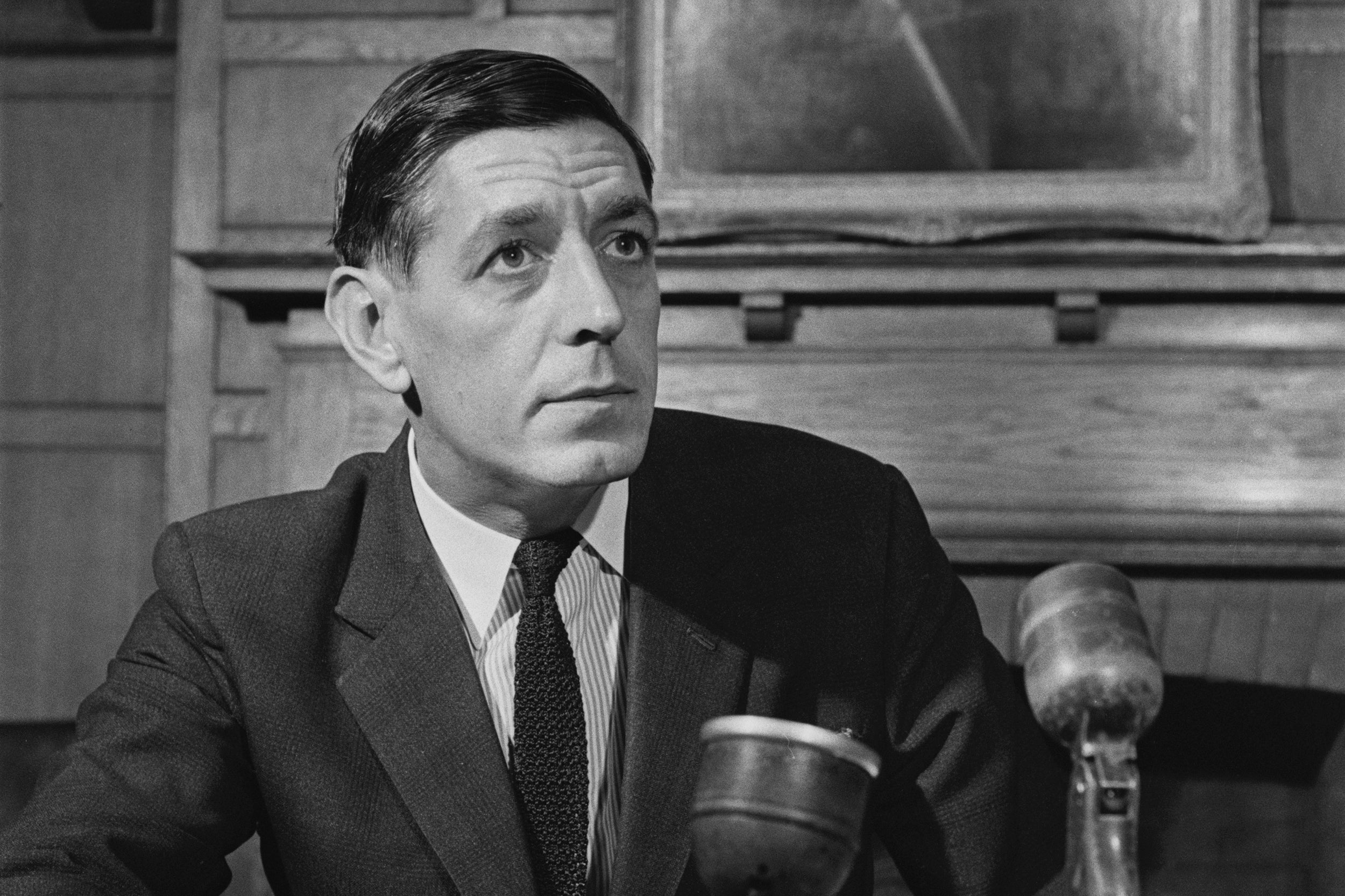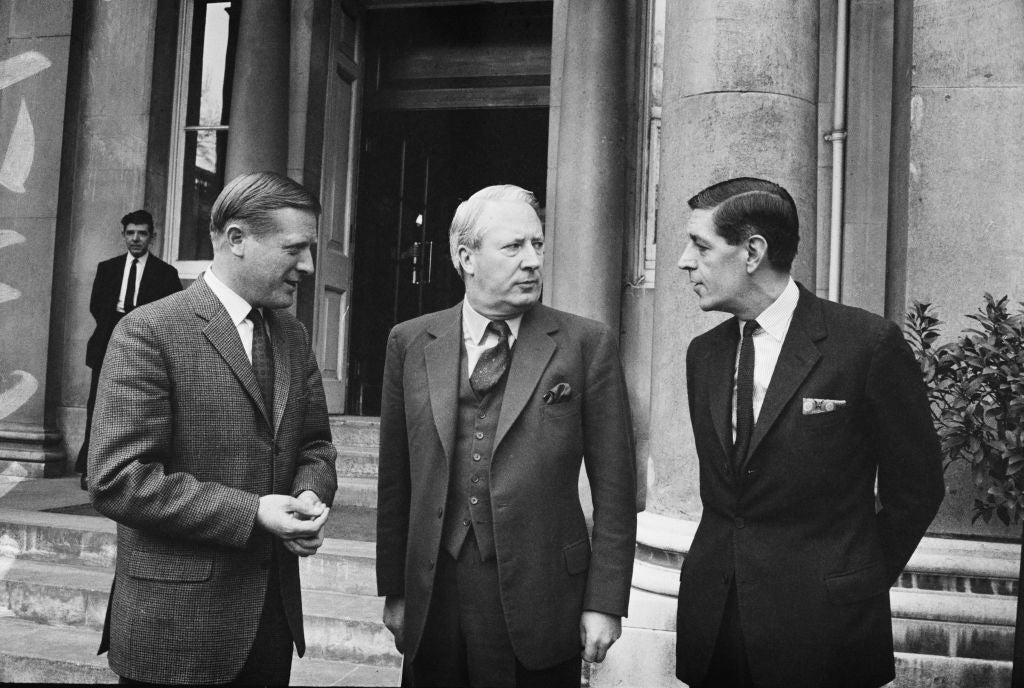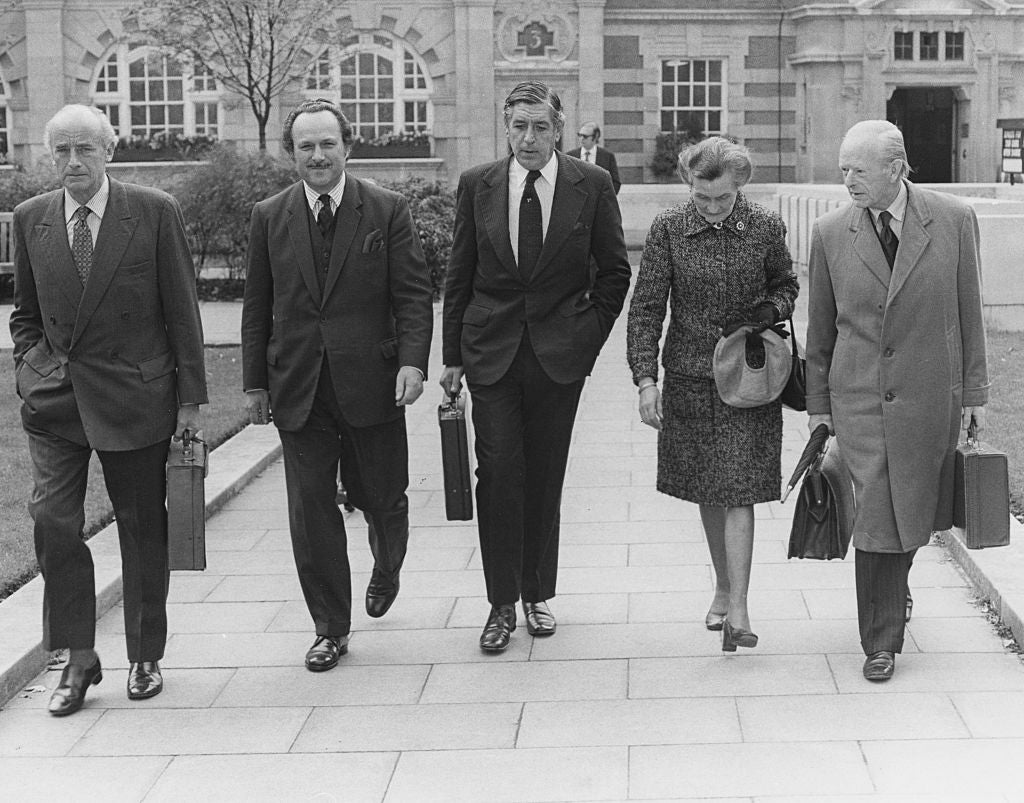Obituary: Sir Edward du Cann, ex-politician and financier who helped elect Margaret Thatcher
Known as ‘Oily’ by his enemies, the Tory grandee sullied his own success with duplicity and greed

Your support helps us to tell the story
From reproductive rights to climate change to Big Tech, The Independent is on the ground when the story is developing. Whether it's investigating the financials of Elon Musk's pro-Trump PAC or producing our latest documentary, 'The A Word', which shines a light on the American women fighting for reproductive rights, we know how important it is to parse out the facts from the messaging.
At such a critical moment in US history, we need reporters on the ground. Your donation allows us to keep sending journalists to speak to both sides of the story.
The Independent is trusted by Americans across the entire political spectrum. And unlike many other quality news outlets, we choose not to lock Americans out of our reporting and analysis with paywalls. We believe quality journalism should be available to everyone, paid for by those who can afford it.
Your support makes all the difference.Sir Edward du Cann, who has died at the age of 93, was one of the most extraordinary, elusive personalities in the financial and political history of Britain in the 1960s and 1970s.
Of his importance there is no doubt: as chairman of the 1922 Committee, he played a considerable role in helping to elect Margaret Thatcher to the leadership of the Tory party. In the City, he was a pioneer in linking life insurance to unit trusts, thus promoting the then-alien idea of personal investment in the stock market.
But his career was marred by a curious political waywardness and the habit of backing losing – if not devious – horses in the City: perhaps the result of a streak of self-destructiveness in his character, shown by his capacity to make errors of timing and judgement throughout his career. His last years were darkened by ever-deepening financial problems, which eventually led him to bankruptcy.
His character was opaque and, although he was charming, his manner was best described as oleaginous. To his enemies he was known as “Oily du Cann”; to his friends “Eduardo”, a nickname that captures his smooth yet faintly raffish manner, making many observers feel that he was two-faced – if not downright shifty.
His elusiveness was well illustrated by his capacity to make a stirring speech or striking intervention at a meeting, but not to follow up the initiative he had gained. He was obviously conscious of the impression given by his opaqueness and his lack of loyalty, and naturally attracted more than his fair share of (probably apocryphal) stories. His closing remark to one conversation was reported to be: “Anything more I can mislead you about, dear boy?” And when asked the time, he is alleged to have replied: “What time would you like it to be, dear boy?”
His background was modest. His father was a writer who became a barrister, studying in the trenches of World War 1, while his mother worked as a shop assistant. When he was nine, she divorced her persistently unfaithful husband – a bold step in those days – and despite their poverty managed to send Edward to Oxford and his brother (later an eminent QC) to Cambridge.
Edward went to a grammar school and at the tender age of 17 studied law (not that successfully) at Oxford, where he contributed a poem to a review edited by Philip Larkin. After a spell in the RNVR in motor torpedo boats, Du Cann started as a clerk in a run-down hotel in Mayfair before moving to work for Sir Denys Lowson, a famously shady financier who in 1950 became Lord Mayor of London, despite many (pretty accurate) rumours about his business dealings.
It was while working for a Lowson subsidiary, the National Group of unit trusts, that he dreamed up the idea of uniting life assurance with savings in unit trusts: a distinct novelty at a time when private investors generally avoided the equity market. After many problems, Du Cann and his associate – the future cabinet minister Peter Walker, then an insurance broker – got enough backing from the maverick London and Edinburgh Insurance Company to set up the Unicorn Trust.
This was so successful that in 1967, a mere ten years later, it was snapped up by Martins Bank. Du Cann found himself an established City figure, remaining chairman of the renamed Barclays Unicorn after Barclays took over the former owners.

From an early age Du Cann had been involved in politics. In 1951 he fought Walthamstow East, the seat of Clement Attlee – then Labour Prime Minister – and in 1955 he fought and lost another safe Labour seat, Barrow-in-Furness. The next year he had a major stroke of luck, gaining the nomination for the supposedly safe Conservative seat of Taunton. The by-election came in early 1956 when the electors were already becoming disillusioned with the Prime Minister, Sir Anthony Eden, and Du Cann only just scraped home with a majority of 600 votes – but he retained the seat more comfortably for the next 31 years.
In the early 1960s, he emerged as the prototype of the sort of “new man” of which the Tory party was sorely in need. He became Economic Secretary to the Treasury in 1962-63, and then Minister for Trade in 1963 at the then-unthinkably young age of 39. Unfortunately, he got across his departmental superior Edward Heath by opposing the abolition of Resale Price Maintenance and establishing his life-long hostility to our entry into the Common Market.
After the 1964 election Lord Home appointed him chairman of the Tory Party, where he did a great deal to modernise its structures. In fact, wrote Julian Critchley, “He was Jeeves to Home’s Bertie Wooster.” He went on to help stage-manage Home’s departure and Heath’s election as leader, but the relationship was poisonous and Du Cann was sacked two years later.
From then on the animosity between the two was bitter and permanent. The only thing they had in common was a love of sailing, although Du Cann – who sailed his own boat without the help of professional crew – was a decidedly more proficient sailor than Heath.
For the next 20 years, he played an important and largely unmentioned role in increasing the importance of Parliamentary committees. He was best known as chairman of the 1922 Committee of Tory back-benchers, where he was re-elected for twelve successive years until he was defeated by Cranley Onslow (later Lord Onslow of Woking) in 1984.
From 1973 to 1975, he was the founder chairman of the Select Committee on Public Expenditure, and in 1979 was also founder chairman of the Select Committee on Treasury and Civil Service Affairs. In 1983 he piloted a bill through Parliament which established the modern structure and role of the National Audit Office.
Indeed, it can safely be said that he and Norman St John Stevas (later Lord St John of Fawsley) were the creators of the House of Commons’ increasingly important committee structure, and as such he was more important than the vast majority of cabinet ministers. He even supported the idea of broadcasting their proceedings.
Unfortunately, his reputation was permanently besmirched by the seemingly endless series of misadventures he suffered in his long quest for sufficient funds to maintain his habitually lavish life style.
In 1969 he had joined Keyser Ullmann, then a relatively small bank; by 1972, when he became chairman, had transformed it into a leading “secondary bank”. From then on, Du Cann was at the heart of the mass of intricate – and generally shady – financial manouevrings that marked the first four years of the 1970s. In 1971, for example, he and the bank were already in trouble because they had sold their shares in the beleaguered Vehicle and General Insurance Group only a few months before its collapse.
In 1972, following the rumpus over “the unacceptable face of capitalism”, Keyser Ullmann became bankers to the Lonrho goup and Du Cann went on the board, becoming chairman 12 years later after the retirement of Duncan Sandys.
One typical transaction involved the acquisition of a controlling interest in the British subsidiary of Investors’ Overseas Services, the controversial financial group run by Bernie Cornfeld – a deal contested by, among others, the Canadian liquidator of the IOS Group. Even more controversial was the purchase of the extremely fringe bank Dalton Barton, owned by Stanley Van Gelder and “Black Jack” Dellal, while the bank became notorious for its involvement with a number of high-flying, if ultimately unsuccessful, property companies.
Yet his bank seemed respectable enough, and even gained backing from the Prudential. As a result, his inherently ambiguous position as a leading City figure as well as a politician did not reduce his influence – for the time being anyway.
In fact, the high point of his political career came in the winter of 1974-75, after Heath’s defeat in the October 1974 election sealed his fate. A small group of Tory MPs urged him to stand for the leadership but he declined, declaring that he would only stand if no electable candidate to Heath came forward on the first ballot. In November, Du Cann’s position was strengthened when he was re-elected as chairman of the 1922 Committee.
During the winter, the meetings of what came to be known as the Milk Street Mafia (because they were held at Keyser Ullmann’s headquarters) gave the impression of being more decisive than perhaps they really were in the choice of a new leader. Clearly, he thought that Margaret Thatcher was electable. He greeted Thatcher’s success with the typically equivocal statement that it had been an “adventurous” choice, akin to those of Disraeli and Lord Home.
After Thatcher’s election – and even more after 1979 – things went from bad to worse. In 1975, Keyser Ullmann revealed losses of £61m, and was kept afloat only by injections of over £60m from the clearing banks. This was a blow from which Du Cann’s finances – already burdened with heavy borrowings – never really recovered. His chairmanship of Lonrho, dominated as it was by the menacing figure of “Tiny” Rowland, did not, to put it mildly, help his reputation.
In 1979, a Board of Trade report condemned the directors of Keyser Ullmann as incompetent and singled out in particular one of Du Cann’s transactions as chairman: an unsecured loan of £17m to help the young financier Christopher Selmes, who fled the country and died of Aids a few years later.
It also emerged that he had made £1m profit after a personal share deal in Cannon Insurance, a subsidiary of Keyser Ullmann. These dubious financial adventures eliminated any hope he might have had of high office – above all, in securing his lifelong ambition of becoming Chancellor of the Exchequer.
Indeed, when Thatcher once floated the idea, Gordon Richardson (then Governor of the Bank of England) told her flatly that he would resign if Du Cann came anywhere near the Treasury.

Not surprisingly Du Cann never showed his capacity for disloyalty so clearly as in the criticisms he mounted of Thatcher’s financial policies from his important pulpit as chairman of the Treasury Select Committee. He continued to campaign for ever-lower government expenditure, and in 1980 called for “a deliberate attempt by the government to get the British economy moving again”.
It was clear from the evidence, he said woundingly a year later, “that there has been no true monetary experiment”. In a pamphlet, he hit at Thatcher’s proud boast of conducting the nation’s finances as would a prudent housewife, by asserting: “It is high time that the government’s practice corresponded with the necessary practice of every family and every corporation and every partnership in the land: namely, to balance one’s accounts.”
By that time he left Parliament in 1987, his reputation had sunk so low that, unlike other former chairmen of the 1922 Committee, he was not given a peerage by the woman whom he had helped elect. This is not surprising, for in the 1980s his financial position steadily deteriorated. Although he was still earning over £400,000 a year as chairman of Lonrho, he faced a number of writs for non-payment of bills, which led to a repossession order on Cothay Manor – the medieval manor house on the edge of his Taunton constituency that had been his family home since the glory days of the early 1970s.
These setbacks, however, were only a foretaste of the much graver problems that emerged in the 1990s.
The final blow that dashed Du Cann’s hopes of a comfortable old age came with yet another unfortunate financial adventure. In 1988, despite friends’ warnings, he became chairman of Homes Assured, a company specialising in the sale of council houses to their tenants. A year later, it went broke owing £10m and three of the directors (though not Du Cann) were accused of fraud. He himself was disqualifed as director of a public company.
In 1993 he was declared bankrupt and lost his flat in Westminster – which, typically, had no fewer than five mortgages attached to it – as well as his Somerset house. Equally typically, the year before he had tried to buy an adjoining farm for £600,000, only to see it repossessed shortly afterwards.
His personal life provided only a temporary consolation. In 1987 he had divorced Sally, the cousin he had married in 1962 when he was 39 and still living with his mother. For a few years he was consoled by his second wife Jennifer, the widow of his friend and Parliamentary colleague Robert Cooke, but she died of cancer eight years later. He was left alone and inconsolable, leading a lonely life in a rented house on Alderney.
Not surprisingly, his autobiography was dedicated to “Jennifer, one day I pray we shall be together again”.
Sir Edward du Cann, born 28 May 1924, died 31 August 2017
Join our commenting forum
Join thought-provoking conversations, follow other Independent readers and see their replies
Comments